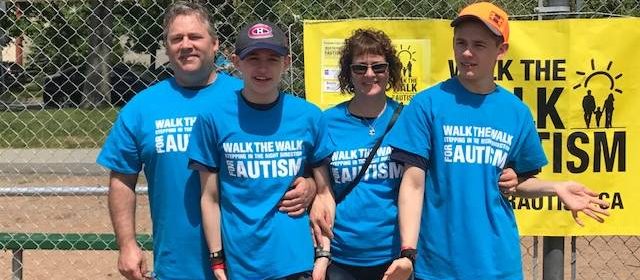N.S. mother shares ‘overwhelming’ experience of caring for kids with autism during COVID-19

Caring for children with autism spectrum disorder can be difficult at the best of times, but during a pandemic, one Nova Scotia mother says the task is “overwhelming.”
Tracey Avery and her husband are at home with their 19-year-old twins, Brandon and Kyle, both of whom have autism and require around-the-clock care.
She said they’re struggling to understand new changes to their routine: no school, no outdoor games, no play dates, and no meetings with their speech language pathologist.
“They don’t understand why they can’t do the things they normally do,” said Avery from her home in Hammonds Plains.
“And both boys are very different from one another, so they sort of feed on each other’s anxieties.”
Since the COVID-19 pandemic hit Nova Scotia, many services have closed their physical doors, including Autism Nova Scotia.
To help families cope, however, the non-profit has moved many of its resources online, including parent support groups, educational content on COVID-19, and tips for managing changes to routine.
Cynthia Carroll, the group’s executive director, said the organization’s families have never encountered a challenge like COVID-19 before and it’s creating a lot of “anxiety and unrest.”
“They’re not connected right now to resource supports like SLPs (speech language pathologists), OTs (occupational therapists), learning centre teachers — even teaching assistants who become really important in their lives,” she explained.
[ Sign up for our Health IQ newsletter for the latest coronavirus updates ]
“Even adults who have been laid off as a result of this… how do they go through applying for benefits and support through Service Canada? That is a really challenging system if you’re neurotypical, but if you have autism it can be even more challenging.”
Earlier this week, the provincial government announced upcoming policy changes to allow respite workers back into homes, under safe conditions.
That would alleviate some of the burden on caregivers for now, said Carroll, but more support is needed, particularly, when the pandemic passes.
“I never want to underestimate the role a parent can play during a very short time like this, during a pandemic,” she told Global News.
“What I do know is, there will be a huge commitment to get children back on track and into those services as soon as it’s safe to do so.”
She said any parents or caregivers of persons with autism can find online support during COVID-19 by messaging Autism Nova Scotia’s Facebook page, or emailing [email protected].
Questions about COVID-19? Here are some things you need to know:
Health officials caution against all international travel. Returning travellers are legally obligated to self-isolate for 14 days, beginning March 26, in case they develop symptoms and to prevent spreading the virus to others. Some provinces and territories have also implemented additional recommendations or enforcement measures to ensure those returning to the area self-isolate.
Symptoms can include fever, cough and difficulty breathing — very similar to a cold or flu. Some people can develop a more severe illness. People most at risk of this include older adults and people with severe chronic medical conditions like heart, lung or kidney disease. If you develop symptoms, contact public health authorities.
To prevent the virus from spreading, experts recommend frequent handwashing and coughing into your sleeve. They also recommend minimizing contact with others, staying home as much as possible and maintaining a distance of two metres from other people if you go out.
For full COVID-19 coverage from Global News, click here.
Source: Read Full Article

